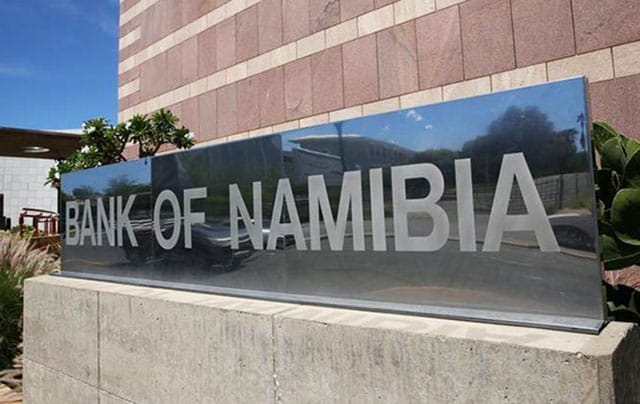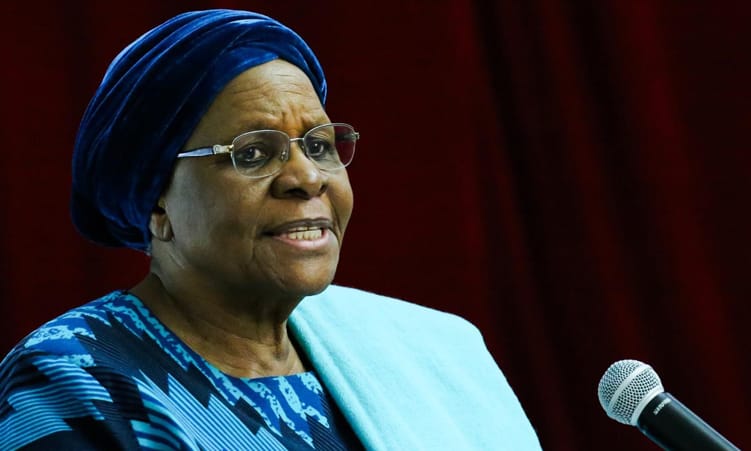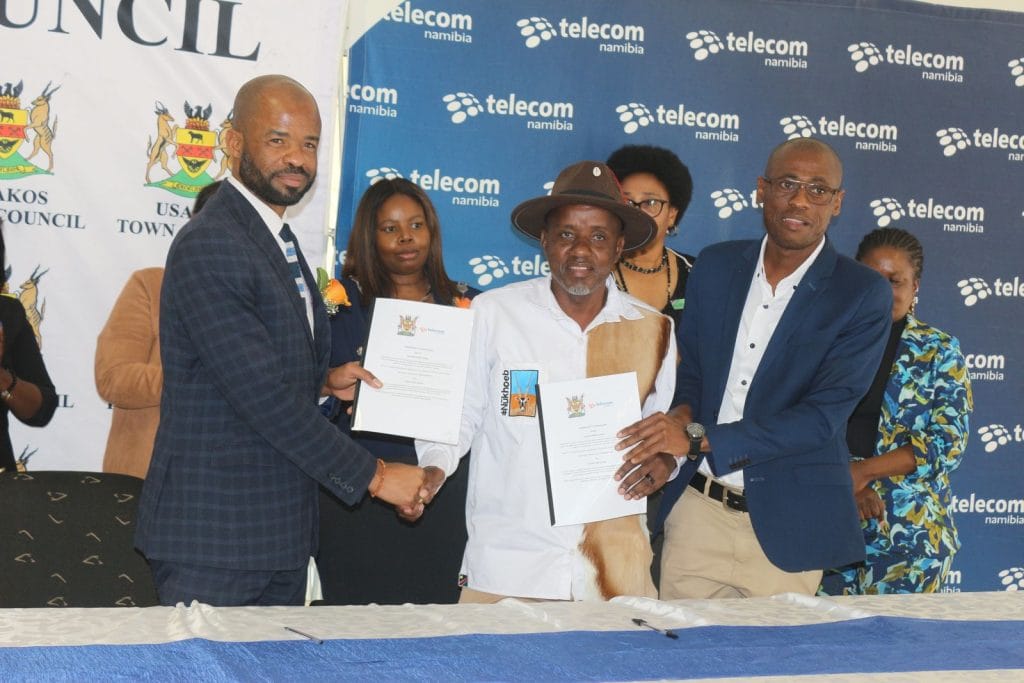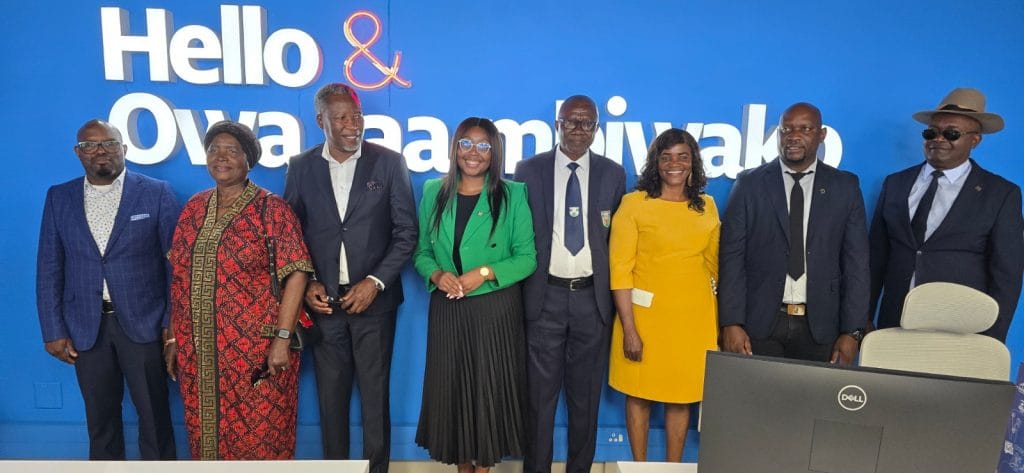- Revolox
- Posts
- Namibia’s Fiscal Crossroads: Nandi-Ndaitwah Urged to Unlock Economic Potential with a New Model# ISSUE 60-☕
Namibia’s Fiscal Crossroads: Nandi-Ndaitwah Urged to Unlock Economic Potential with a New Model# ISSUE 60-☕
Namibia stands at a pivotal juncture as President Netumbo Nandi-Ndaitwah’s administration is presented with a rare opportunity to reshape the nation’s economic destiny.

Revolox banner
Welcome to Revolox Media – Where Namibia’s Stories Live and Breathe
In this week’s issue, we zoom in on the pulse of Namibia’s economic and technological transformation. From the resilient hustle of SMEs navigating shifting financial tides to bold policy decisions at the Bank of Namibia, we're unpacking the forces shaping our future.
We explore the fiscal crossroads facing the nation as Netumbo Nandi-Ndaitwah is called upon to champion a new economic path. Meanwhile, on the innovation front, Telecom Namibia teams up with Usakos Town Council to spark a smart city revolution, and MTC brings digital access closer to home with its latest Mobile Home launch in Omuthiya.
Get informed. Get inspired. Stay ahead with Revolox Media.
MARKET CORNER
NSX Index Overview
Index | Price | % Change | YoY % Change | YTD % Change |
|---|---|---|---|---|
NSX Overall | 1,809.19 | 0.00% | 2.83% | 0.44% |
NSX Local | 748.87 | 0.00% | 10.14% | 8.32% |
Top Movers: NSX Local Stocks
Stock | Price (N$) | % Change | YoY % Change | YTD % Change | Volume (Shares Traded) |
|---|---|---|---|---|---|
FirstRand Namibia | 51.51 | 0.00% |
10.77% | 10.77% | 21,660 | |||
Letshego Holdings Namibia Ltd | 6.60 | 0.00% | 41.94% | 32.00% | 0 |
Nictus Holdings | 2.90 | 0.00% | 30.63% | 16.00% | 0 |
Standard Bank Namibia | 10.80 | 0.00% | 24.28% | 18.94% | 0 |
Capricorn Group Ltd | 21.74 | 0.00% | 12.29% | 5.64% | 0 |
Economic Pulse
Indicator | Value | Percentage % | Change (YoY) |
|---|---|---|---|
Real GDP (Dec 31, 2024) | 157,476.47M | 3.71% | 3.71% |
Nominal GDP (Dec 31, 2024) | 245,097.32M | 7.08% | 7.08% |
Namibia Inflation (Jun 30, 2025) | 3.66% | 5.79% | -21.12% |
Private Sector Credit Extension (May 31, 2025) | 119,330.60M | 0.54% | -2.25% |
Namibian Repo Rate (Jun 30, 2025) | 6.75% | 0.00% | -12.90% |
Foreign Exchange Rates
Currency Pair | Value | Percentage % | Change (YoY) |
|---|---|---|---|
USD/NAD | 17.59 | -0.15% | -3.60% |
GBP/NAD | 23.80 | 0.10% | 0.87% |
EUR/NAD | 20.67 | 0.24% | 4.03% |
BTC/NAD | 2,109,239.15 | 1.52% | 69.80% |
Disclaimer: The financial data and market information provided in the tables below, including stock prices, indices, exchange rates, economic indicators, and other metrics, are sourced from user-provided data and are accurate as of July 14, 2025, based on the latest input. This information is for informational purposes only and does not constitute financial advice, investment recommendations, or an offer to buy or sell securities. Market data is subject to change, and past performance is not indicative of future results. Users should verify data independently and consult with a qualified financial advisor before making investment decisions. Revolox will not be responsible for any errors, omissions, or losses arising from the use of this information.
BUSINESS & ECONOMY

Image credit: The Namibian
SMEs: The Backbone of Namibia’s Economy
Accounting for over 70% of employment and contributing substantially to the nation’s GDP, SMEs remain central to Namibia’s economic landscape. However, these businesses are vulnerable, having faced prolonged droughts, disrupted global supply chains, and tightening consumer spending in recent years.
“Access to finance and markets remains a key hurdle,” explains Windhoek-based business development consultant Martha Tjombe. “Many SMEs operate informally or without financial cushioning, which heightens their susceptibility to economic shocks.”
Innovation and Digital Adoption as Pathways to Resilience
Industry experts highlight agility and innovation as critical to the future success of Namibia’s SMEs. Increasingly, digital platforms are essential—not just for marketing, but for sales, payments, and business operations. Tools such as e-commerce, mobile banking, and cloud-based software help SMEs reduce costs and expand reach locally and internationally.
Diversification and Collaboration: Mitigating Risk
Businesses overly reliant on single markets or products face increased risks during economic instability. Expanding into new customer segments and offering complementary services helps stabilize revenue streams.
Collaboration through business associations and cooperatives allows SMEs to pool resources, share knowledge, and access valuable training and advocacy. Peer support within these networks often proves crucial during turbulent times.
Skills Development and Sustainability Focus
Continuous learning—especially in financial literacy, digital skills, and entrepreneurial thinking—equips SME owners to navigate uncertainty and make informed decisions.
Sustainability is becoming a priority, with businesses in agriculture, tourism, and manufacturing adopting eco-friendly practices to enhance climate resilience. These efforts not only reduce environmental risks but also appeal to green investors and environmentally conscious consumers.
Government and Private Sector Support
The Namibian government, through the former Ministry of Industries, Mines and Energy, provides financing options via the Development Bank of Namibia and mentorship through the Namibia Investment Promotion and Development Board. Despite this, many SMEs face challenges accessing these benefits due to bureaucratic hurdles and limited awareness.
To fill the gap, local banks have begun offering SME-specific financial products, and organizations like the Namibia Chamber of Commerce and Industry continue facilitating events and training to strengthen SME resilience and growth.
Entrepreneur Insights
“Uncertainty is a given, but it’s also a catalyst for growth,” reflects entrepreneur Alina Nghidengwa, founder of a local organic skincare brand launched during the pandemic. “We’ve had to think bigger, leverage digital tools, and deeply understand our customers. That’s how we’ve grown.”
Looking Ahead
While hurdles remain, Namibia’s SMEs demonstrate that innovation, adaptability, and robust support systems can turn challenges into opportunities — driving sustainable growth for Namibia’s broader economic future.
By Moses Waiganjo, senior lecturer and work-integrated learning coordinator, Namibia University of Science and Technology, Department of Governance and Management Sciences.
Source: The Namibian

Image credit: The Namibian
Bank of Namibia Stands Firm on No Deposit Home Loans Despite IMF Concerns
The Bank of Namibia (BoN) has defended its decision to maintain a no-deposit requirement for first and second home loans, dismissing recent recommendations from the International Monetary Fund (IMF) calling for a reversal.
Last week, the IMF advised Namibia to scrap regulations allowing homebuyers to acquire their first and second residences without making down payments. This recommendation was outlined in the IMF’s report on credit development and macro-financial risks, which warned that current rules could increase the banking sector’s exposure to future non-performing loans (NPLs).
“Given the large share of credit to the housing sector and existing vulnerabilities, Bank of Namibia (BoN) should reverse the elimination of down payments on first and secondary residential properties,” the IMF report stated. The rationale stems from the fact that household mortgages constitute the bulk of bank loan books and have been leading contributors to rising NPL levels in Namibia.
However, BoN spokesperson Kazembire Zemburuka responded, emphasizing that the central bank had conducted thorough due diligence before relaxing loan-to-value (LTV) requirements in 2023. “The BoN acknowledges the IMF’s concern regarding banking exposure to the housing sector, but from a financial stability and macroprudential perspective, we assess credit risk holistically,” said Zemburuka.
The LTV ratio, representing the loan amount relative to the property value, was amended in 2023 to reflect prevailing economic conditions and low mortgage demand. The updated rules enable buyers to purchase their first and second homes without a deposit, while third and subsequent residential loans require a minimum 10% down payment. Additionally, once a first residence mortgage is fully paid off, buyers purchasing another property are again eligible for no deposit.
Zemburuka noted that Namibian banks remain well-capitalized to absorb potential shocks from the housing sector, and the BoN will continue vigilant monitoring. “We will take necessary macroprudential actions when warranted to ensure financial stability,” he added.
Bottom Line
Data from the central bank up to May 2025 revealed that non-performing mortgage loans stood at N$3.29 billion, accounting for over half of all loan defaults nationally. Loans are classified as non-performing if payments remain overdue by more than 90 days, signalling trouble for homeowners struggling with repayments.
As Namibia’s housing market continues to evolve, the debate between financial inclusion and risk management remains central to regulatory decisions shaping the sector’s future.
Source: The Namibian

Image credit: The Namibian
Namibia’s Fiscal Crossroads: Nandi-Ndaitwah Urged to Unlock Economic Potential with a New Model
Namibia stands at a pivotal juncture as President Netumbo Nandi-Ndaitwah’s administration is presented with a rare opportunity to reshape the nation’s economic destiny. The need to reimagine how the country raises revenue is now urgent, with mounting evidence that the current over-reliance on personal and value-added taxes is unsustainable in a nation of just over three million.
With only a small portion of citizens in formal employment, income tax and VAT shoulder much of the budget, contributing a sizable 35% to 40% of government revenue. This concentration of fiscal responsibility places excessive pressure on the working and entrepreneurial middle class, discouraging investment and stifling job creation. Many small businesses struggle under this tax regime, and the middle class is eroding as a result.
Continued dependency on taxing this narrow base risks deepening inequality and stalling economic growth, leaving Namibia’s fiscal model looking ever more precarious.
Learning from Global Playbooks
Dubai in the early 1970s offers a persuasive case study. With a population far smaller than Namibia’s today, Dubai used its oil wealth to build world-class infrastructure, reduce taxes, and attract global investment—transforming itself into a global commercial hub. The message for Namibia is clear: abundant natural resources present an untapped solution for funding national development.
Namibia’s mineral bounty includes diamonds, gold, uranium, lithium, and rare earth metals. Revamping outdated mineral agreements and elevating royalties could retain more value in-country. Local mineral processing, instead of mere raw exports, would increase jobs and revenues.
Conversely, the cautionary tale of Kenya—where mass protests forced the government to retract a burdensome finance bill—shows the risks of overtaxation in societies with limited resources or opportunity for broad-based wealth creation.
Funding the Future: Minerals, Not More Taxes
Leaning heavily on mineral wealth to finance the state could liberate Namibia from the international debt trap. Loans from institutions like the IMF and World Bank often bring tough strings attached—cuts to subsidies and services that hurt the nation’s most vulnerable. A budget built on mineral revenues, by contrast, creates domestic stability and grant greater long-term planning.
Incentivizing Industry and Attracting Investment
A bold, resource-driven approach would include targeted tax breaks for:
Local manufacturing
Agricultural development
Technology start-ups
Mining and mineral services
A low-tax, clear-rule environment would make Namibia a magnet for international business, bringing in capital and generating new jobs for the local population.
The Path Forward
This is not an argument to eliminate taxes, but to deploy them judiciously—shifting from a heavy burden on individuals and consumers to leveraging Namibia’s natural wealth for broad-based prosperity. The existing system is simply too outdated, with too few contributors.
President Nandi-Ndaitwah’s administration stands at a crossroads. The true solution lies beneath our feet. By letting Namibia’s mineral wealth fund the budget—not its already overstretched taxpayers—the nation can transition to a fairer, investment-friendly, and sustainable economic future.
Source: The Namibian
TECH

Image credit: The Brief
Telecom Namibia and Usakos Town Council Partner to Roll Out Fibre Infrastructure, Paving Way for Smart City Transformation
Telecom Namibia and the Usakos Town Council have signed a Memorandum of Understanding (MoU) to deploy new fibre infrastructure aimed at transforming Usakos into a smart city, reinforcing efforts to improve digital connectivity and stimulate local economic growth.
At the signing ceremony, Erongo Regional Governor Natalia /Goagoses emphasized the strategic importance of the partnership, stating, “Partnerships with entities like Telecom Namibia are not just welcomed – they are essential. They lay the foundation for sustainable economic growth, improve public service delivery, and bring us closer to our vision of a connected, thriving Erongo Region.” She also called on the public to protect telecommunications infrastructure, warning that vandalism and theft pose serious threats to development goals.
The joint initiative targets the rollout of a fibre network that will provide high-speed internet and enable value-added services across key sectors such as education, healthcare, and small business development. Usakos Town Council CEO Lesley Grand Goreseb hailed the collaboration as a pivotal moment for the town, noting, “This partnership with Telecom Namibia is a turning point for Usakos. We are excited to embark on this journey to become a smart city, bringing unparalleled digital opportunities and a higher quality of life to our residents.”
Telecom Namibia CEO Stanley Shanapinda highlighted the company’s experience from its smart city collaboration in Oranjemund, where it successfully deployed 67.6 kilometres of new fibre routes. “Reliable connectivity is at the heart of any smart city,” Shanapinda said. “Our experience in Oranjemund demonstrates how critical connectivity is to the success of a smart city ecosystem. We are confident that Telecom Namibia is the ideal partner to support Usakos in becoming a digitally advanced, inclusive, sustainable, and thriving community.”
The planned services in Usakos will mirror the Oranjemund model, offering internet speeds ranging from 8 Mbps to 120 Mbps. Telecom Namibia noted that this project will serve as a blueprint for future smart city initiatives across Namibia, emphasizing the need for close collaboration between town councils and the ICT sector to realize smart homes and businesses.
“This project will set a benchmark for other towns,” Shanapinda added. “We are positioned and experienced to replicate this success in other towns, delivering significant value through future-proof fibre technology that offers lower maintenance requirements and increased speed capacity.”
The agreement builds on Telecom Namibia’s expanding national fibre network, which now covers over 13,000 kilometres, reinforcing the company’s commitment to driving Namibia’s digital transformation and regional development.
Sourec: The Brief

Image credit: The Brief
MTC Expands Reach with 38th Mobile Home Launch in Omuthiya, Oshikoto Region
Mobile Telecommunications Limited (MTC) has expanded its footprint by opening a new Mobile Home outlet in Omuthiya, marking its 38th location nationwide and the first in the Oshikoto regional capital. The new facility officially opened on Friday and promises to bring essential MTC services closer to residents of Omuthiya and surrounding villages, who previously had to travel to neighboring towns such as Ondangwa for similar services.
Addressing Growing Demand in Northern Namibia
Octivious Kahiya, MTC’s Chief Commercial Officer, explained that the decision to establish a presence in Omuthiya was driven by significant customer growth in the area and its environs. “MTC’s intent and desire to have a presence in Omuthiya has been on the planning radar for nearly two years. What gave further motivation to this was the astonishing customer growth witnessed not only in Omuthiya but also in the region and surrounding constituencies,” Kahiya said.
The telecom giant has plans to further strengthen its network in the north-eastern regions of Namibia this year, with upcoming outlet openings anticipated in Katima Mulilo, Divundu, and Rundu.
Community Welcomes Improved Access to Services
Local residents expressed their enthusiasm about the accessibility improvements. Sakaria Shivute, a 58-year-old resident of Omuthiya, said, “I will no longer have to spend money on transport fares to Ondangwa for MTC services. We are happy, and we welcome MTC in our town.”
Government Endorses Digital Inclusion Efforts
Information and Communication Technology Minister Emma Theofelus, who officiated the launch, underlined the importance of digital equity for all Namibians. “Omuthiya is the capital town of Oshikoto Region, and the residents there, just like any other, deserve access to quality ICT services,” she remarked. The minister also encouraged the community to take ownership of the facility, terming the initiative as “development on our doorstep.”
Oshikoto Governor Sacky Kathindi highlighted the impact the new Mobile Home will have on rural communities and small businesses. “This mobile home stands as a symbol of progress. The geographical location should no longer be a limitation for accessing mobile services or digital tools that can uplift livelihoods,” said Kathindi.
Looking Ahead
With the newest outlet in Omuthiya, MTC continues to advance its mission of bridging connectivity gaps and supporting the upliftment of Namibia’s underserved regions through enhanced access to telecommunications services.
Source: The Brief
PERSONAL DEVELOPMENT
“All individuals have the need to see themselves as competent and autonomous, with limitless room for growth… The desire to become everything they are capable of becoming lies at the heart of self-actualization.”
— Abraham Maslow
Remember: Personal development is not a race or a destination; it’s a way of living each day intentionally, learning, and evolving bit by bit. Start small, remain curious, and celebrate your progress—your future self will thank you
Reply